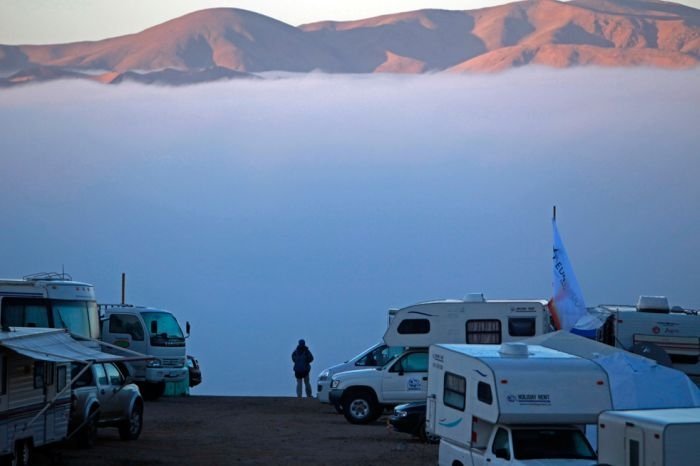|
|
All 33 Miners Rescued, 2010 Copiapó Mining Accident, Chile
|
On 23 August, voice contact was made with the miners. They reported having few medical problems. The doctor in charge the rescue operation reported to the media that "they have considerably less discomfort than we might have expected after spending 18 days inside the mine, at 700 metres deep and under high temperatures and high humidity". The doctors also reported that they had already been provided with a 5% glucose solution and a drug to prevent stomach ulcers resulting from food deprivation. Material was sent down in 5-foot-long (1.5 m) blue plastic capsules nicknamed palomas ("doves"), taking an hour to reach the miners. Engineers coated the boreholes with a gel in order to ensure the integrity the shafts and ease the passage the capsules. In addition to high-energy glucose gels, rehydration tablets, and medicine, rescuers also sent down oxygen after the miners reported there was not enough air. Delivery solid food began a few days later. Two other boreholes were completed—one for enriched oxygen, the second for video conferences to allow daily chats with family members. Relatives were also permitted to write letters, but were asked to keep them optimistic.
Out concern for the miners' mental health, rescuers hesitated to tell the miners that according to the conservative rescue plan, the rescue might take months, with an eventual extraction date close to Christmas. The miners who had been trapped since August would miss many holidays, including the Chilean Bicentennial Celebration and crucial soccer games in addition to their personal anniversaries. The miners were fully informed, however, on 25 August, the exact prognosis for their rescue and the complexity the plans to get them out. The mining minister reported that the men took the news well.
Rescue workers and consultants described the miners as a very disciplined group. Psychologists and doctors worked with the rescue effort to ensure the miners kept busy and mentally focused. Fluorescent lights with timers were sent down to keep the men on a normal schedule by imitating day and night. The miners affirmed their capability to participate in rescue efforts, saying "There are a large number pressionals who are going to help in the rescue efforts from down here." Psychologists believe the miners' having a role in their own destiny is important for maintaining motivation and optimism. They divided themselves into three groups, one being responsible for the palomas, a second in charge security and preventing further rock falls, and a third focusing on health. Luis Urzúa became the overall leader and the oldest miner, Mario Gómez, was chosen for spiritual guidance. Psychiatrists have supported that this hierarchical structure that preserves order and routine within the group trapped miners is crucial to their mental health.
It was determined that Yonni Barrios was the most qualified the miners to administer medicine and communicate on health issues due to his previous medical training. Barrios vaccinated the group against tetanus and diphtheria. Many the miners developed severe skin problems due to the hot and wet conditions. They were sent quick-drying clothing and small mats so they would not have to sleep directly on the ground. In September, they received medical survival kits, including tourniquets, IV kits, and splints, as well as first aid training by videoconferencing.
|
|









